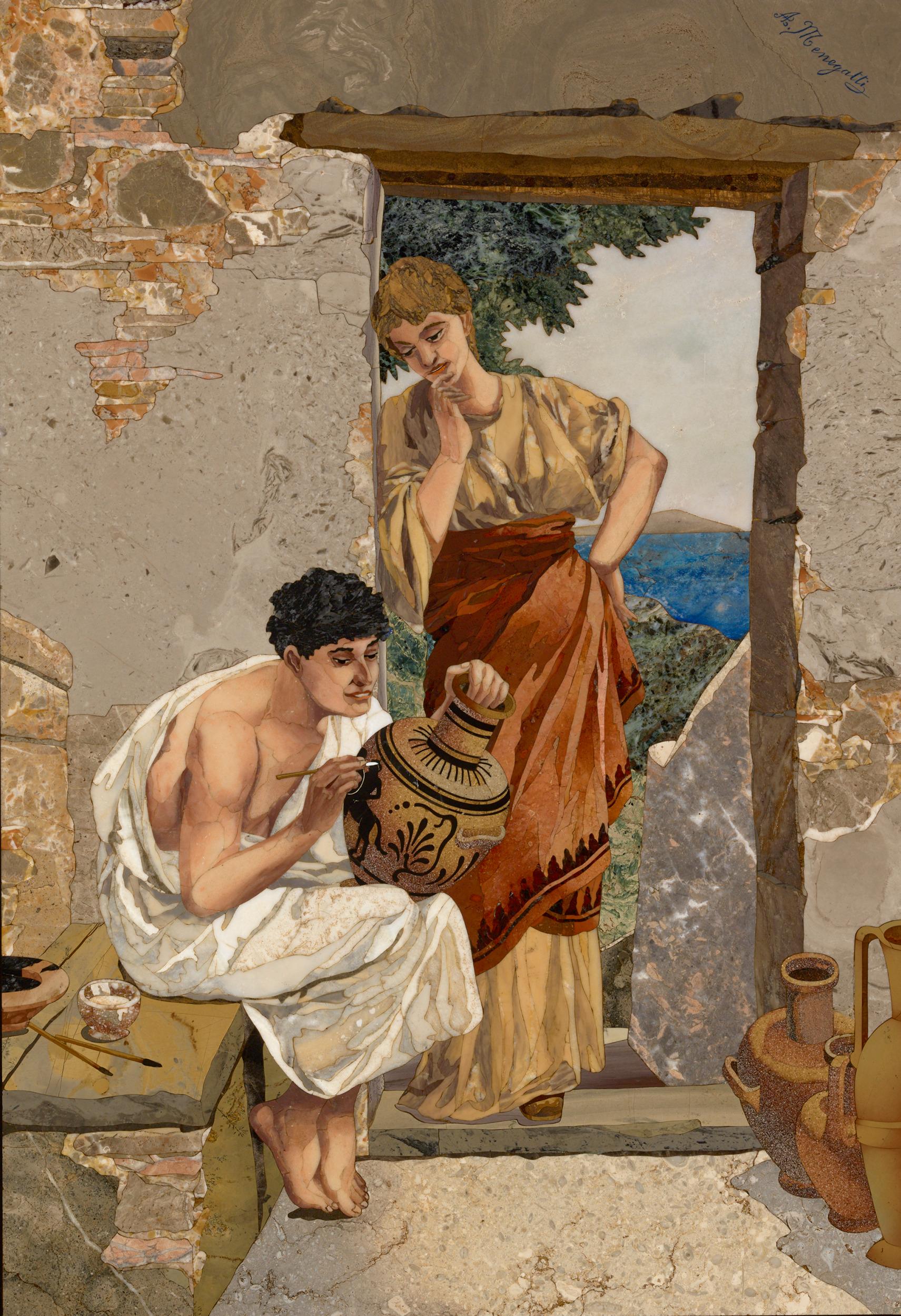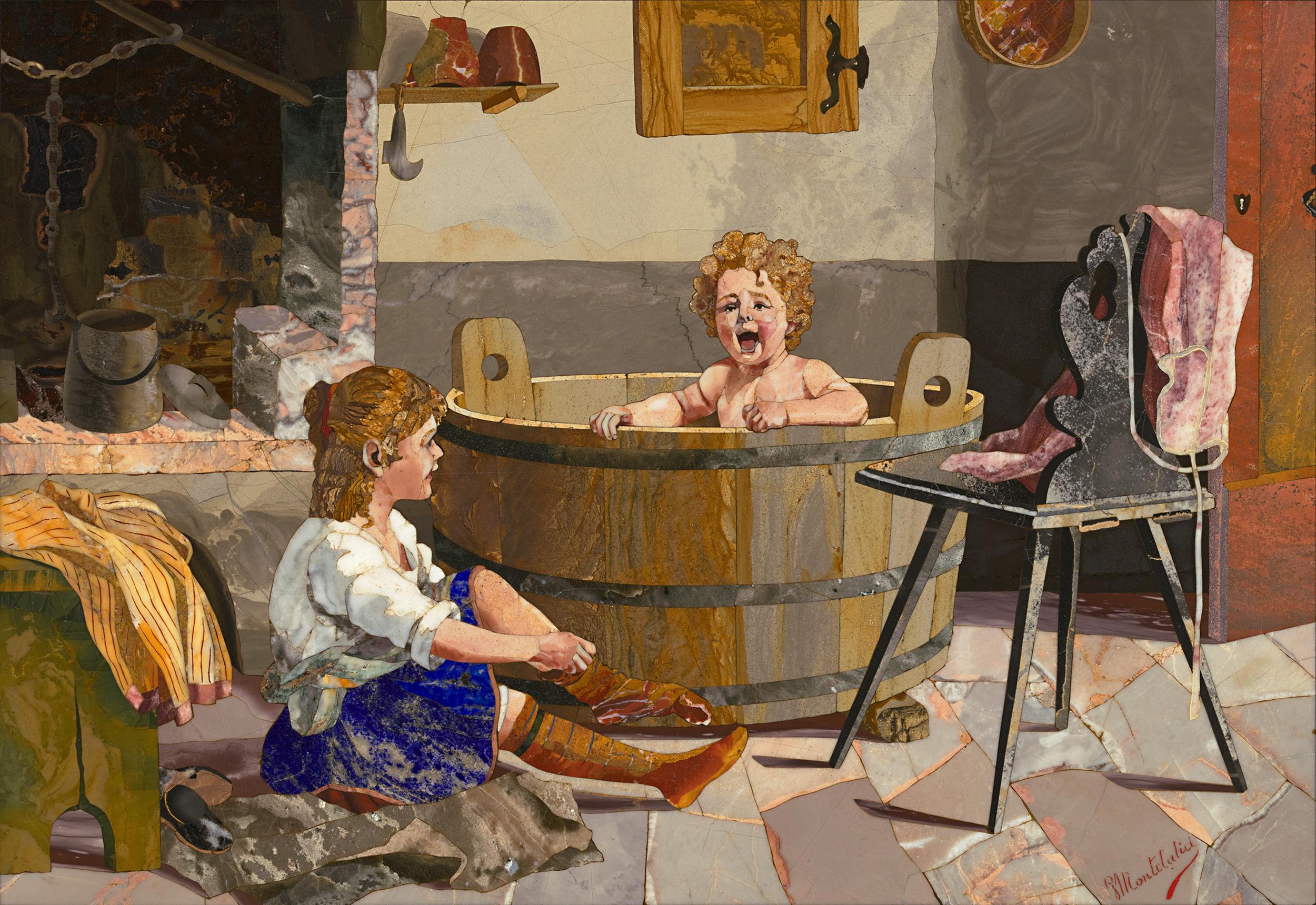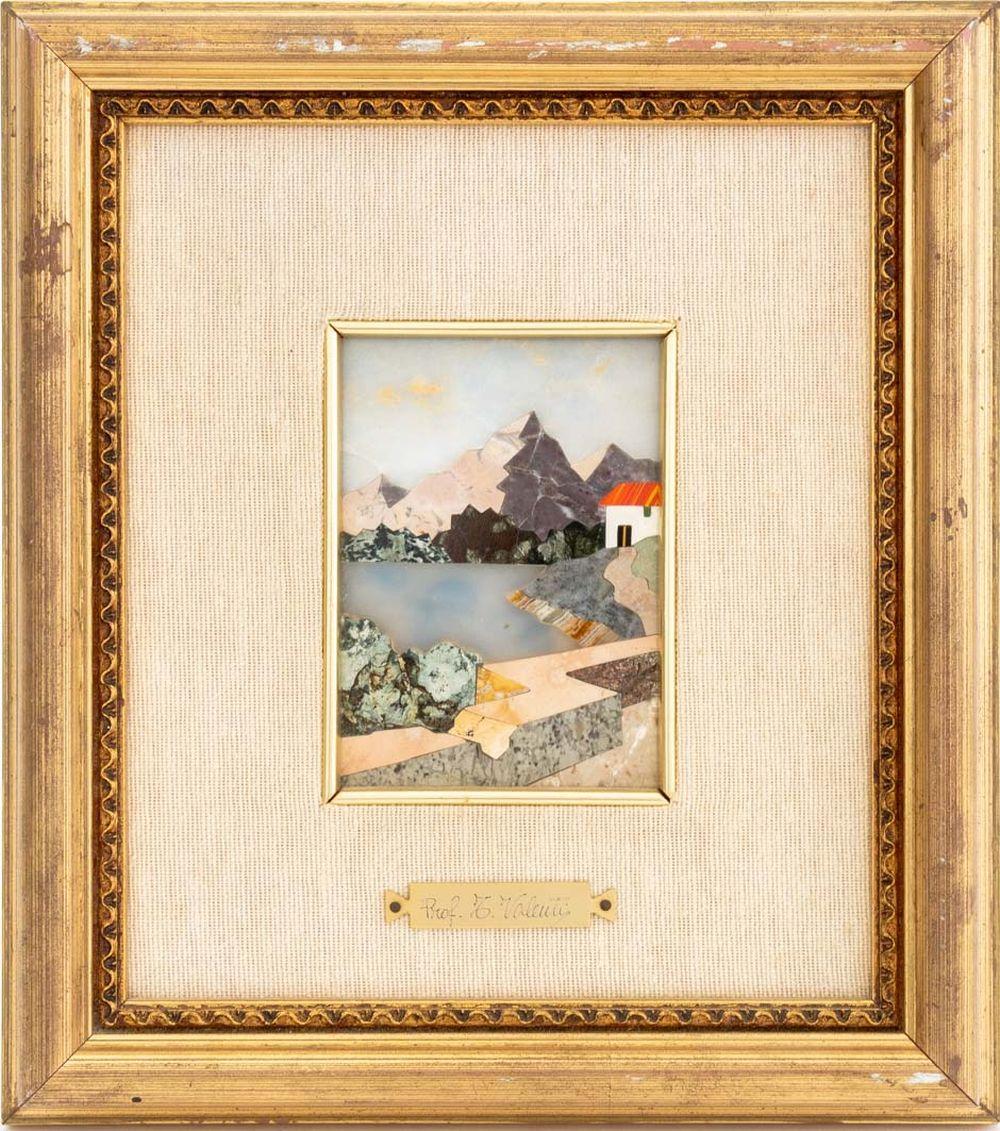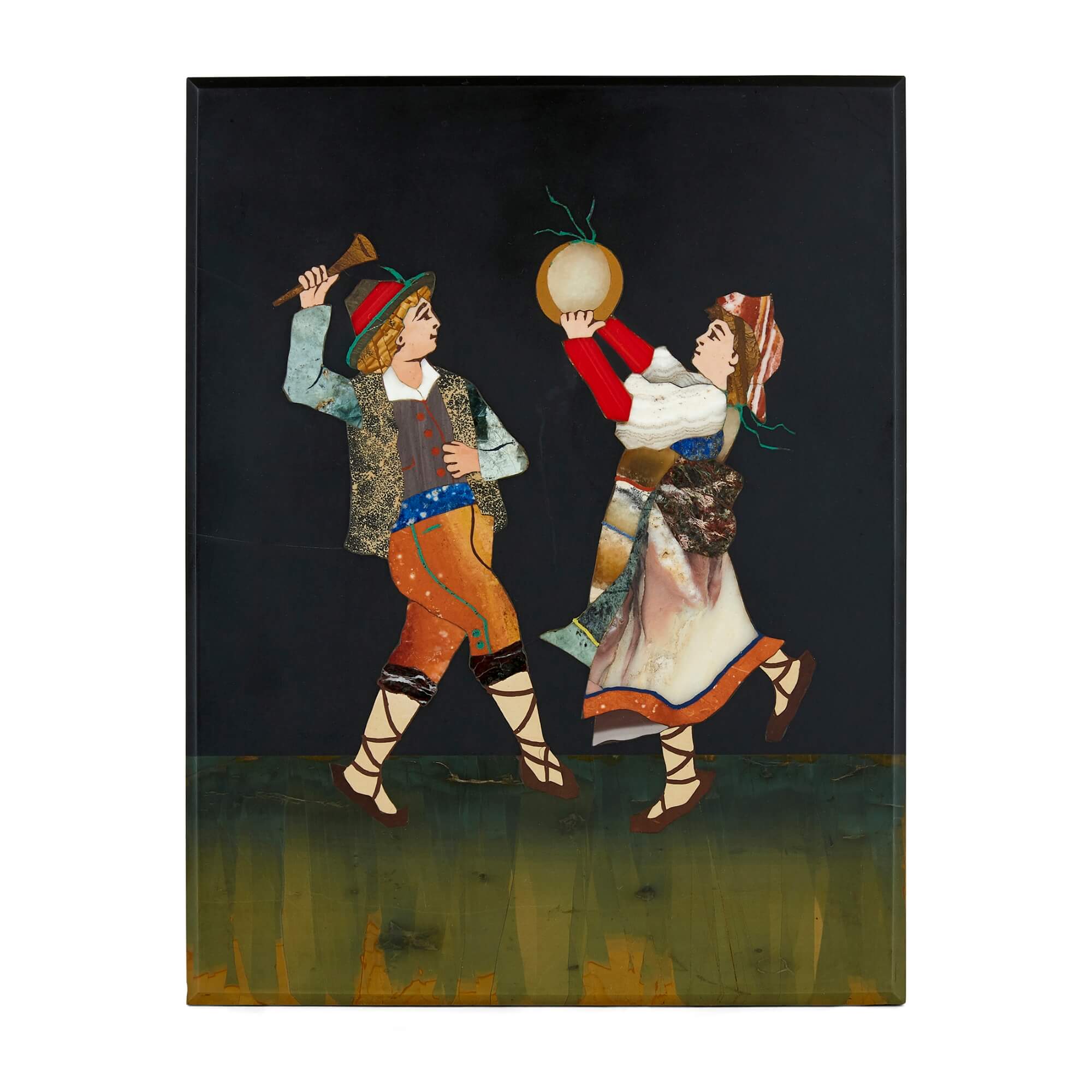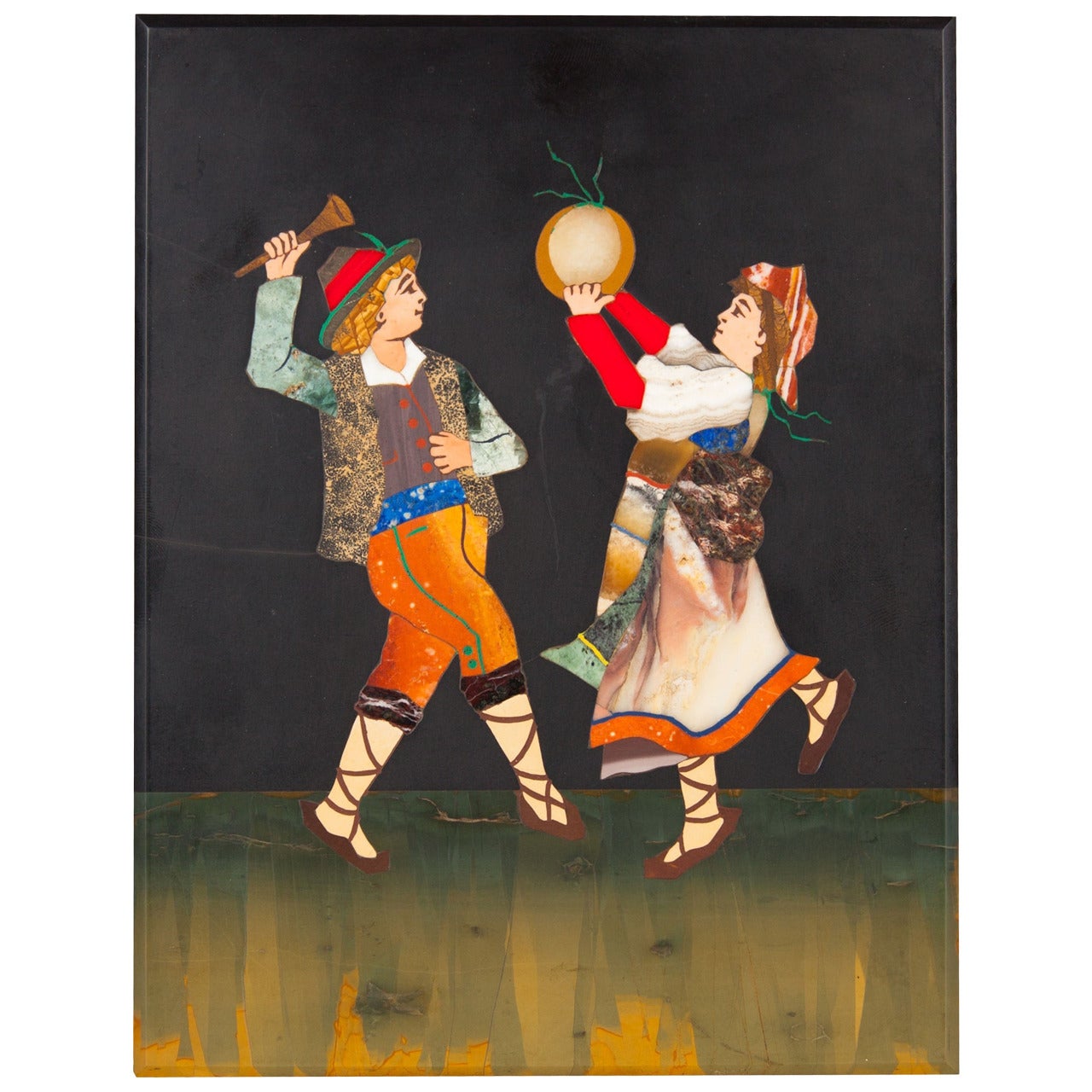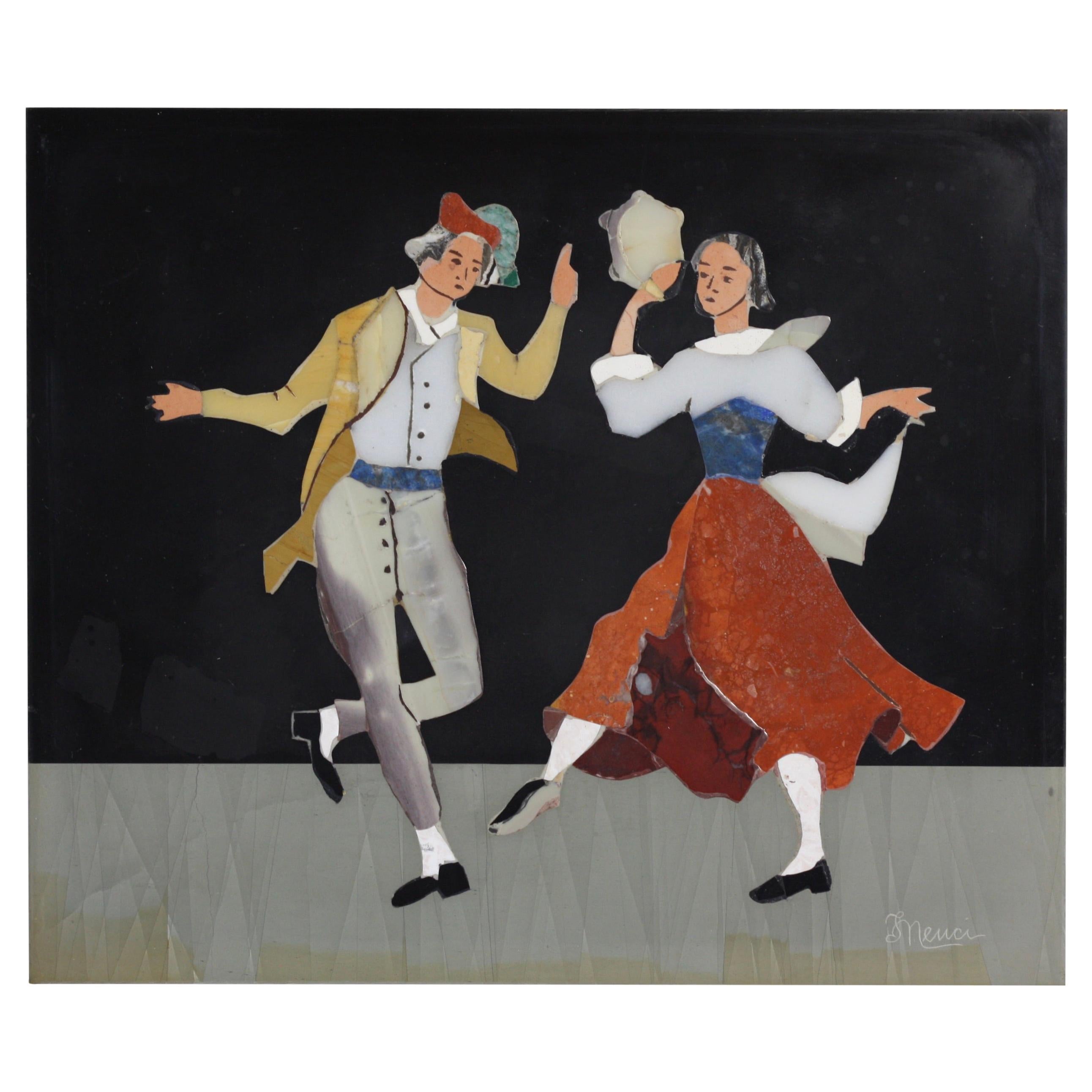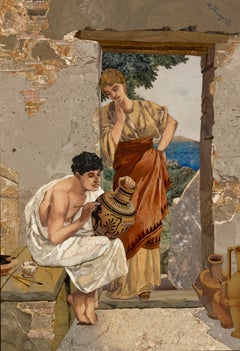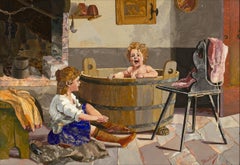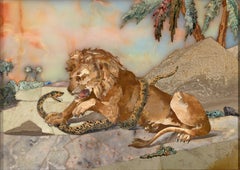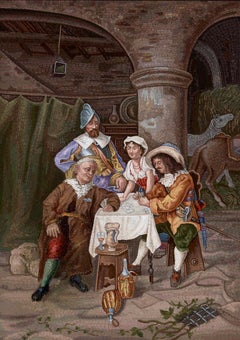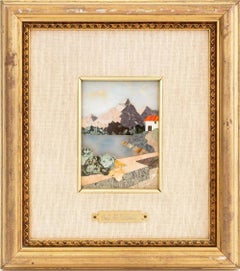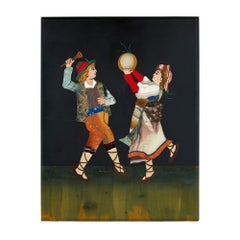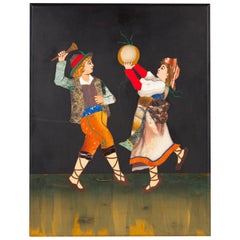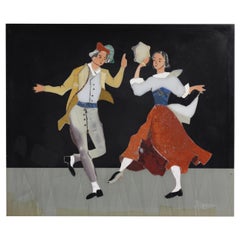Items Similar to Pietre Dure Plaque Of Village Children
Want more images or videos?
Request additional images or videos from the seller
1 of 7
UnknownPietre Dure Plaque Of Village ChildrenCirca 1880
Circa 1880
$98,500
£74,393.82
€85,936.41
CA$138,772.48
A$148,625.37
CHF 79,899.97
MX$1,805,141.98
NOK 1,009,575.11
SEK 924,341.08
DKK 642,102.06
About the Item
Magnificent and colorful, this enchanting Florentine work of art is not a painting, but upon closer inspection is revealed to be a superb example of the intensive art of pietre dure. Depicting a charming scene of a mother catching her children in the act of a mischievous prank. Rather than paint, this sumptuous piece uses hundreds of different kinds of polished marble and minerals to make this playful scene come to life. Each piece is carefully chosen for color and pattern, cut with the utmost precision and precisely inlaid onto a stone base, thereby creating an image of such beauty and skill as to have the perfect trompe l'oeil effect.
Pietre dure, also known as pietra dura, first developed in antiquity, and originally consisted of shaping stones with small saws, wires and other metal instruments and adding them to decorative objects such as vases or small sculptures. The art was revived during the Renaissance by Italian craftsmen, and the first hard-stone workshop was established by the Medici family in Florence in 1588. The art was also practiced at the courts of Naples, Madrid, Prague, Paris and elsewhere. The Italians were particularly fond of pietre dure and used the technique on everything from monumental cabinets to tiny boxes. From the late 16th century, the colorful stones were arranged on furniture as landscapes and flower scenes. These items were also popular with wealthy aristocrats making their Grand Tour through Italy in the 18th and 19th centuries, who bought them in droves and even sent larger pieces home.
The technique requires that fine marbles and stones be inlaid into a stone base. By using materials of varying colors, artisans were able to create patterns and pictures in much the same manner as a mosaic. The technique was expensive, requiring not only precious materials but also highly skilled craftsmen. As a result, many works were completed using imitation marble and are known as scagliola. True marble and stone pietre dure works such as this are very rare and highly collectible.
Signed "M Zaccagnini" (lower right)
Circa 1880
Plaque: 17" high x 22 1/4" wide (43.18 x 56.52 cm)
Frame: 22" high x 27 1/8" wide (55.88 x 68.9 cm)
- Creation Year:Circa 1880
- Dimensions:Height: 22 in (55.88 cm)Width: 27.13 in (68.92 cm)Depth: 2 in (5.08 cm)
- Medium:
- Period:
- Condition:
- Gallery Location:New Orleans, LA
- Reference Number:Seller: 31-85401stDibs: LU18614272422
About the Seller
5.0
Vetted Professional Seller
Every seller passes strict standards for authenticity and reliability
Established in 1912
1stDibs seller since 2013
21 sales on 1stDibs
Typical response time: 15 hours
- ShippingRetrieving quote...Shipping from: New Orleans, LA
- Return Policy
More From This Seller
View AllPietre Dure Plaque Of Ancient Artisan By Alberto Menegatti
Located in New Orleans, LA
A young man clad in classical robes paints an amphora vase as an attractive admirer observes him in this magnificent pietre dure plaque by Florentine artisan Alberto Menegatti. The work is emblematic of the charming scenes of rural life that were favored by Italian pietre dure artists. The superlative quality and beauty of the stone specimens utilized to create the composition distinguish this piece, and the artist’s ingenious use of the natural striations and inclusions in his stones allows him to convey texture and shadow to brilliant effect.
The art of pietre dure developed from the ancient art of opus...
Category
Early 20th Century More Art
Materials
Stone
Pietre Dure of The Morning Bath
Located in New Orleans, LA
This incredible Italian pietre dure is made up of a show-stopping variety of hardstones, creating a magnificent narrative scene. The hardstones recreate the composition of a popular ...
Category
19th Century Mixed Media
Materials
Stone, Marble
Pietre Dure Plaque with Lion by Tito Francolini
Located in New Orleans, LA
This extraordinary Florentine work of art has the appearance of a painted scene, but upon closer inspection is revealed to be a superb example of the art of pietre dure. Composed by ...
Category
Early 20th Century Mixed Media
Materials
Stone, Marble
Gamblers Italian Micromosaic
Located in New Orleans, LA
A friendly game of cards is the subject of this 19th-century Italian micromosaic. A special type of mosaic that uses incredibly small pieces of tesse...
Category
19th Century Other Art Style More Art
Materials
Glass, Mosaic
Temple of Vespasian and Titus Roman Micromosaic
Located in New Orleans, LA
The ruins of the ancient Roman Temple of Vespasian and Titus are the subject of this Italian micromosaic. Crafted in intricate detail, the scene is composed from hundreds of tiny gla...
Category
Late 19th Century More Art
Materials
Mosaic
Gum Kids
By Leslie Thrasher
Located in New Orleans, LA
Two young children play an ill-advised game of gum stretching on the family couch in this charming composition by famed American illustrator, Leslie Thrasher. Painted towards the start of the Great Depression, Thrasher provided light-hearted images of the lives of everyday people to distract Americans from their troubles. These images appeared on the covers of Liberty Magazine, for whom he produced one cover illustration a week for six consecutive years.
Born in 1889 in Piedmont, West Virginia, Thrasher studied at the Pennsylvania Academy of Fine Arts as a teenager and received a scholarship to study art abroad in Paris. Upon his return, he began studying under Howard Pyle, known as the “father of American illustration.” Thrasher sold his first cover illustration to the Saturday Evening Post in 1912, four years before Norman Rockwell’s first Post cover, and he would go on to produce over 360 magazine covers throughout his career. He painted humorous, relatable scenes of life in America with colorful characters set against white backgrounds. He was also a successful commercial artist, painting advertisements for Cream of Wheat, Chesterfield Cigarettes...
Category
20th Century Other Art Style Figurative Paintings
Materials
Canvas, Oil
You May Also Like
Florentine Pietra Dura Plaque
Located in Astoria, NY
Florentine Pietra Dura Plaque, inlaid with various types of hardstone to depict a mountainous landscape scene, signed "Prof. T. Valenti" to verso, giltwood frame.
Image: 4" H x 2.7...
Category
Mid-20th Century More Art
Materials
Stone, Marble
Antique Italian Figurative Pietra Dure Panel
Located in London, GB
Antique Italian figurative pietra dure panel
Italian, 19th century
Measures: Height 18cm, width 14cm, depth 1cm
This beautiful pietra dure panel depicts in the Renaissance style...
Category
Antique 19th Century Italian Renaissance Decorative Art
Materials
Marble
Pietra dura antique Italian marble plaque
Located in London, GB
Depicting a dancing couple holding instruments in traditional costumes.
This charming antique plaque exhibits an impressive execution of the pietra dur...
Category
Antique 19th Century Italian More Furniture and Collectibles
Materials
Precious Stone
Italian Pietra Dura Panel Arte de Mosaico
Located in West Palm Beach, FL
An Italian Pietra Dura Panel
Early 20th century
Arte del Mosaico
Via San Giuseppe 36-38
Florence, Italy
By Nenci
Measures: Height 7.93 in. (20.16 cm...
Category
Early 20th Century Paintings
Materials
Porcelain
Very Important and Rare Roman Micromosaic Plaque, circa 1840
Located in West Palm Beach, FL
A very important and rare Roman micromosaic plaque, circa 1840-1850.
circular, "Village People"
in a later giltwood frame
plaque sight size 12 1/2" b...
Category
Antique 1840s Paintings
Materials
Cut Glass
Italian Antique Micromosaic Plaque picture Of "The Chavelier"
Located in Jacksonville, FL
Vintage from the 1940s
Ships from Florida! Shorter shipping distances are kinder to the planet
Read the full description
Materials: micromosaic, micromosaic plaque, micromosaic pic...
Category
1940s More Art
Materials
Mosaic
